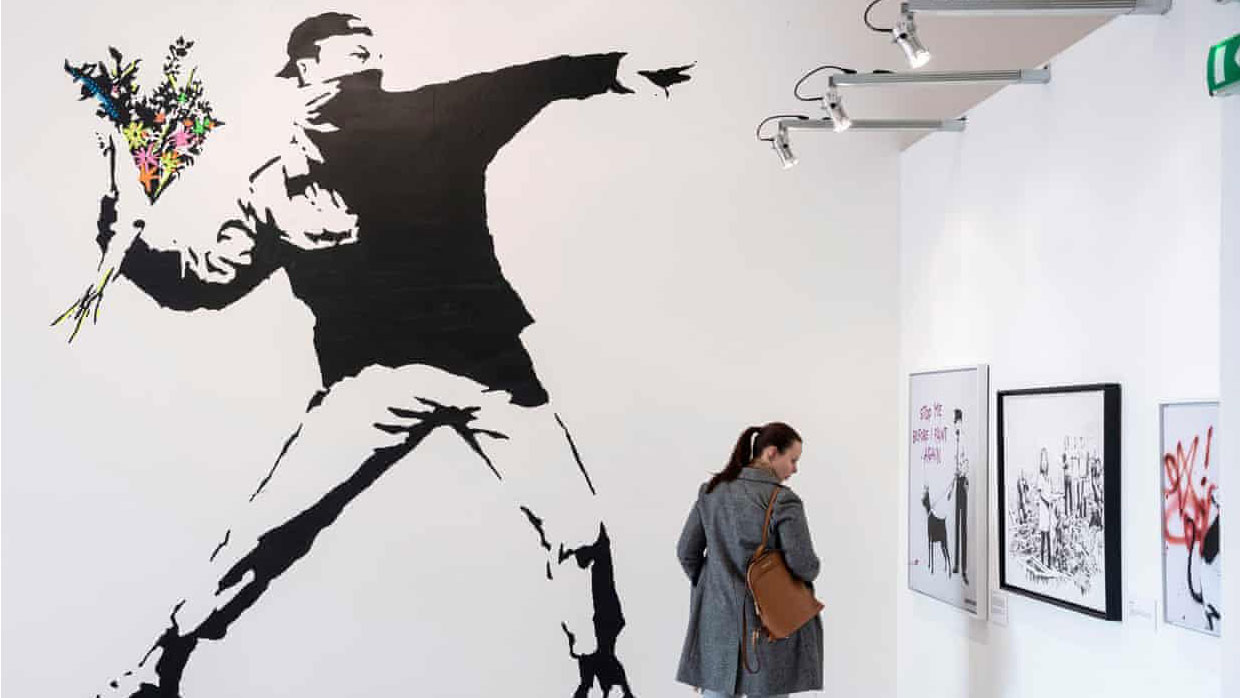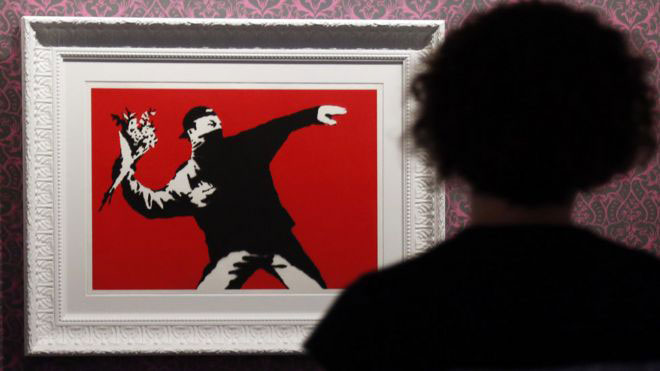Banksy chooses anonymity over his trademark rights
And now his entire portfolio could be at risk.

Sign up to Creative Bloq's daily newsletter, which brings you the latest news and inspiration from the worlds of art, design and technology.
You are now subscribed
Your newsletter sign-up was successful
Want to add more newsletters?
Banksy has proven just how important his anonymity is to him with a recent court case, which has seen the loss of his trademark rights over the iconic 'flower bomber' artwork (above). After challenging a greeting cards company for its use of the art, Banksy would have had to reveal his true identity for the legal claim to stand – something he was not prepared to do.
As a result, the European Union Intellectual Property Office decided that street artist Banksy has no rights over the image (which is one of the world's most famous examples of street art). Not only was Banksy's anonymity provided as a reason for the decision, but his practice of graffiti was also given as an example of his disregard for property rights in general. The EUIPO underlined its point by quoting Banksy's own book, in which he stated "copyright is for losers," and asserted that efforts to protect his trademark have been "inconsistent with honest practices".

Pest Control Office, Banksy's legal representatives, first won the trademark rights for 'flower bomber' in 2014. Though an artist would usually apply for copyright for an image to protect against its use by other parties, Banksy would have had to share his real identity for a copyright claim to stand, hence the application for a trademark instead.
But in 2018, a battle began when a greetings card company – Full Colour Black – tried to use the image, arguing that Banksy's anonymity meant they should be able to replicate it. Banksy reacted by setting up Gross Domestic Product, a gift shop in Croydon, in an attempt to commercialise the trademark and keep it valid against the challenge (see his Instagram post below). This is the part the EUIPO says is dishonest, with the panel deciding "his intention was not to use the mark as a trademark to commercialise goods ... but only to circumnavigate the law. These actions are inconsistent with honest practices."
A photo posted by @banksy on Oct 1, 2019 at 7:00am PDT
Unfortunately for Banksy, the EUIPO ruled against him because of his anonymity – deciding that he couldn't be identified unquestionably as the owner of the artwork because of his hidden identity. "Banksy has chosen to remain anonymous and for the most part to paint graffiti on other people's property without their permission rather than to paint it on canvases or his own property," it asserted. "He has also chosen to be very vocal regarding his disdain for intellectual property rights."
According to Full Colour Black's lawyer Aaron Wood, "Banksy's entire trademark portfolio is at risk" after the decision.
Whatever Banksy's thought process is over this particular assertion of intellectual property rights, it's clear the shroud of anonymity is much more important to him than anything else. Which is why Neil Buchanan was so quick to deflect the spotlight when a recent online conspiracy placed him as the mysterious artist. Because, of course, that's exactly what Banksy would do.
Sign up to Creative Bloq's daily newsletter, which brings you the latest news and inspiration from the worlds of art, design and technology.
Read more:

Georgia has worked on Creative Bloq since 2018, and has been the site's Editor since 2023. With a specialism in branding and design, Georgia is also Programme Director of CB's award scheme – the Brand Impact Awards. As well as immersing herself with the industry through attending events like Adobe Max and the D&AD Awards and steering the site's content streams, Georgia has an eye on new commercial opportunities and ensuring they reflect the needs and interests of creatives.
